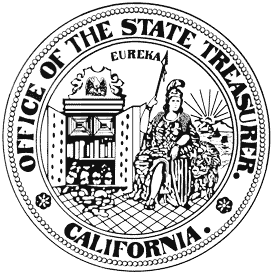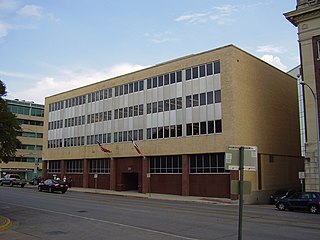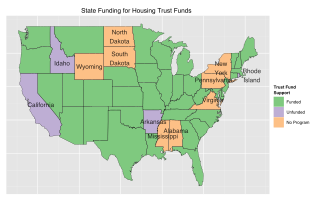
The United States Department of Housing and Urban Development (HUD) is one of the executive departments of the U.S. federal government. It administers federal housing and urban development laws. It is headed by the secretary of housing and urban development, who reports directly to the president of the United States and is a member of the president's Cabinet.

The government of the Commonwealth of Puerto Rico is a republican democracy established by the Constitution of Puerto Rico in 1952. Under a system of separation of powers, the government is divided among three branches: the executive, the legislative, and the judicial. As a territory of the United States, the government of Puerto Rico is under the jurisdiction of the federal government of the United States.
The Low-Income Housing Tax Credit (LIHTC) is a federal program in the United States that awards tax credits to housing developers in exchange for agreeing to reserve a certain fraction of rent-restricted units for lower-income households. The program was created under the Tax Reform Act of 1986 (TRA86) to incentivize the use of private equity in developing affordable housing. Projects developed with LIHTC credits must maintain a certain percentage of affordable units for a set period of time, typically 30 years, though there is a "qualified contract" process that can allow property owners to opt out after 15 years. The maximum rent that can be charged for designated affordable units is based on Area Median Income (AMI); over 50% of residents in LIHTC properties are considered Extremely Low-Income. Less than 10% of current credit expenditures are claimed by individual investors.

Fiona Ma is an American politician and accountant. She has been serving as the California state treasurer since January 7, 2019. She previously was a member of the California Board of Equalization (2015–2019), the California State Assembly (2006–2012), and the San Francisco Board of Supervisors (2002–2006).

Canada Mortgage and Housing Corporation is Canada's federal crown corporation responsible for administering the National Housing Act, with the mandate to improve housing by living conditions in the country.

The state treasurer of California is a constitutional officer in the executive branch of the government of the U.S. state of California. Thirty-five individuals have held the office of state treasurer since statehood. The incumbent is Fiona Ma, a Democrat. The state treasurer's main office is located in the Jesse M. Unruh State Office Building in Sacramento.
A community development financial institution (US) or community development finance institution (UK) - abbreviated in both cases to CDFI - is a financial institution that provides credit and financial services to underserved markets and populations, primarily in the USA but also in the UK. A CDFI may be a community development bank, a community development credit union (CDCU), a community development loan fund (CDLF), a community development venture capital fund (CDVC), a microenterprise development loan fund, or a community development corporation.

The state auditor of Minnesota is a constitutional officer in the executive branch of the U.S. state of Minnesota. Nineteen individuals have held the office of state auditor since statehood. The incumbent is Julie Blaha, a DFLer.

The Oklahoma Department of Transportation (ODOT) is an agency of the government of Oklahoma responsible for the construction and maintenance of the state's transportation infrastructure. Under the leadership of the Oklahoma secretary of transportation and ODOT executive director, the department maintains public infrastructure that includes highways and state-owned railroads and administers programs for county roads, city streets, public transit, passenger rail, waterways and active transportation. Along with the Oklahoma Turnpike Authority, the department is the primary infrastructure construction and maintenance agency of the State.

The Oklahoma Housing Finance Agency (OHFA) is a non-profit organization which serves the people of Oklahoma by offering affordable housing resources, including loans and rent assistance. OHFA was created in 1975 when Governor of Oklahoma David L. Boren approved the agency's first trust indenture. OHFA is a public trust with the State of Oklahoma as the beneficiary. The Trust was established to better the housing stock and the housing conditions in the State of Oklahoma and administers the Section 8 housing program along with other housing programs for the State.

The Texas Department of Housing and Community Affairs (TDHCA) is the state's lead agency responsible for homeownership, affordable rental housing, community and energy assistance programs, and colonia activities serving primarily low income Texans. The Manufactured Housing Division of TDHCA regulates the manufactured housing industry in Texas. The Department annually administers more than $400 million through for-profit, nonprofit, and local government partnerships to deliver local housing and community-based opportunities and assistance to Texans in need. The department is headquartered at 221 East 11th Street in Austin.
Deborah VanAmerongen joined Nixon Peabody as a strategic policy adviser in February 2010. She works closely with attorneys in the firm's Affordable Housing practice to provide advice to developers, owners, and managers of affordable housing, as well as their financing partners, in the preservation and production of affordable housing nationwide.
Pennsylvania Department of Community and Economic Development is a cabinet-level state agency in Pennsylvania. The mission of the department is to enhance investment opportunities for businesses and to improve the quality of life for residents. The department works to attract outside corporations, spur expansion of existing local employers, and foster start-ups by providing tax incentives and technical assistance. Additionally, the agency provides grant funding to community groups and local governments for projects such as revitalizing "Main Street" infrastructure, enhancing low income housing availability, or improving access to technology.
Kentucky Housing Corporation (KHC), the Kentucky state housing agency, was created by the 1972 Kentucky General Assembly to provide affordable housing opportunities. KHC is a self-supporting, public corporation.

The Neighborhood Reinvestment Corporation, doing business as NeighborWorks America, is a congressionally chartered nonprofit organization that supports community development in the United States and Puerto Rico. The organization provides grants and technical assistance to more than 240 community development organizations. NeighborWorks America provides training for housing and community development professionals through its national training institutes. Since 2007, NeighborWorks America has administered the Congressionally created National Foreclosure Mitigation Counseling Program.

Housing trust funds are established sources of funding for affordable housing construction and other related purposes created by governments in the United States (U.S.). Housing Trust Funds (HTF) began as a way of funding affordable housing in the late 1970s. Since then, elected government officials from all levels of government in the U.S. have established housing trust funds to support the construction, acquisition, and preservation of affordable housing and related services to meet the housing needs of low-income households. Ideally, HTFs are funded through dedicated revenues like real estate transfer taxes or document recording fees to ensure a steady stream of funding rather than being dependent on regular budget processes. As of 2016, 400 state, local and county trust funds existed across the U.S.
Non-profit housing developers build affordable housing for individuals under-served by the private market. The non-profit housing sector is composed of community development corporations (CDC) and national and regional non-profit housing organizations whose mission is to provide for the needy, the elderly, working households, and others that the private housing market does not adequately serve. Of the total 4.6 million units in the social housing sector, non-profit developers have produced approximately 1.547 million units, or roughly one-third of the total stock. Since non-profit developers seldom have the financial resources or access to capital that for-profit entities do, they often use multiple layers of financing, usually from a variety of sources for both development and operation of these affordable housing units.

The executive branch of the government of Puerto Rico is responsible for executing the laws of Puerto Rico, as well as causing them to be executed. Article IV of the Constitution of Puerto Rico vests the executive power on the Governor—who by its nature forms the executive branch.

Howard County Housing is the umbrella organization for the Howard County Department of Housing and Community Development and the Howard County Housing Commission. The Department is Howard County Government’s housing agency, and the Commission is a public housing authority and non-profit. Both have boards that meet monthly.

The Wisconsin Economic Development Corporation (WEDC) is a public-private agency in the state of Wisconsin designed to assist business development and innovation through loans, grants, tax credits, and technical assistance programs.














